Supreme Court rules Boris Johnson’s shutdown of parliament was unlawful
Boris Johnson’s United Nations visit was supposed to promote his post-Brexit vision to the world. Instead the British PM has been forced to return home with his tail between his legs.
World
Don't miss out on the headlines from World. Followed categories will be added to My News.
British Prime Minister Boris Johnson landed in New York this week on a speedy Royal Air Force jet, bringing his vision of a post-Brexit “Global Britain” to the United Nations.
Then he sat on the tarmac for more than an hour.
The captain informed passengers that another VIP’s plane was occupying the stand.
It was the first hint that Johnson’s trip to the U.N.’s General Assembly might not run entirely smoothly.
The annual gathering — a diplomatic-media bear pit where scores of world leaders compete for attention in the middle of a teeming, gridlocked Manhattan — can be a daunting experience for new leaders.
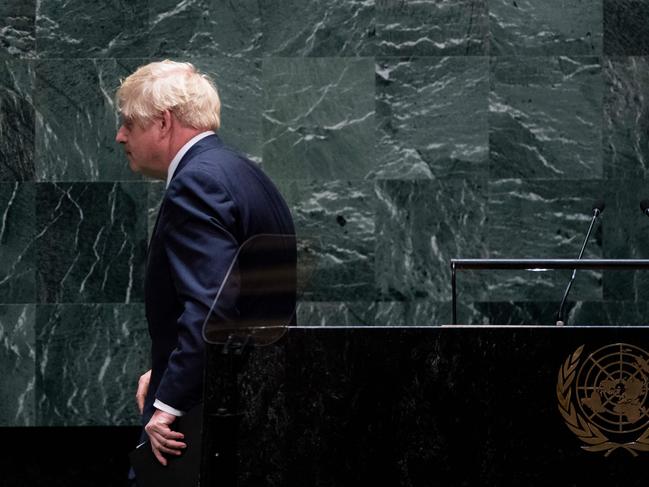
But for Johnson it could have been something of a respite: a chance to leave the melodrama of Britain’s stalled departure from the European Union behind for 72 hours, show a Brexit-befuddled world that Britain is still a serious global player and cement his relationship with U.S. President Donald Trump.
That was never going to be easy, and it got spectacularly harder on Tuesday, when the U.K. Supreme Court ruled that Johnson acted illegally when he suspended parliament just weeks before Britain is due to leave the EU on Oct. 31.
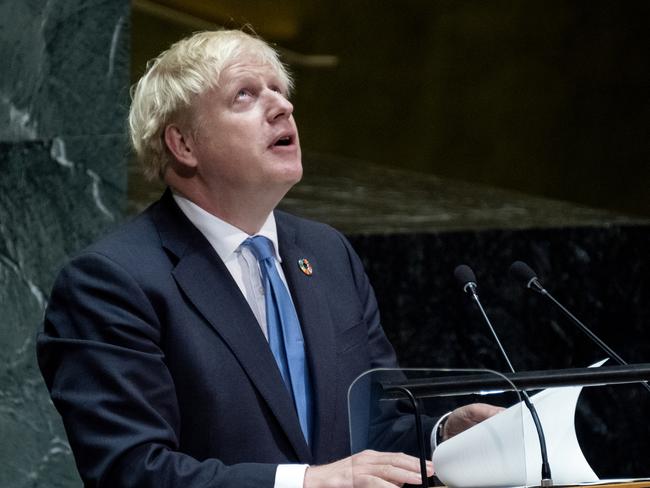
The 11 justices ruled the suspension “unlawful, void and of no effect.”
Absorbing the news before dawn at a luxury New York hotel, Johnson’s advisers were taken aback.
The damning, unanimous ruling was much worse for the government than they had hoped.
With lawmakers set to return to parliament overnight, Johnson’s trip was abruptly cut short. He would fly back to London immediately after his speech to the General Assembly this afternoon evening — one he was still drafting on Tuesday afternoon.
Johnson soldiered on as if it were business as usual, giving a speech to business leaders and holding a series of meetings with other world leaders.
He brushed aside questions about whether he would resign, said he “strongly” disagreed with the court decision and suggested he might try to suspend parliament for a second time.
He also rebuffed calls by the opposition to resign form is leading Queen Elizabeth II when he told her to give her formal assent to Parliament’s suspension.
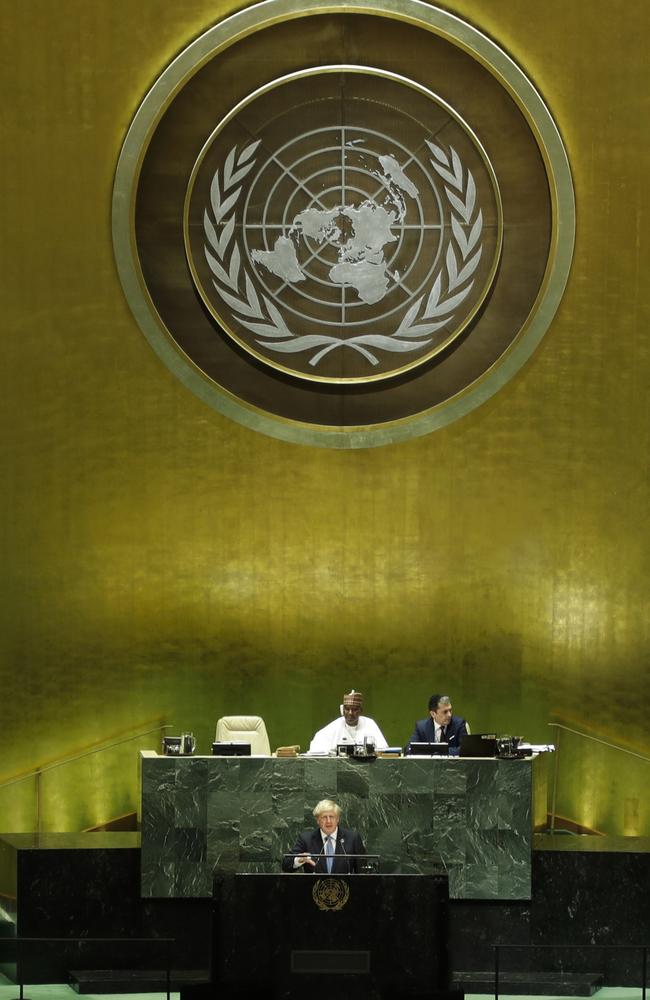
Rapid movement followed by sudden halts and reversals have long marked the roller-coaster political career of Johnson, who ricocheted between high office and political back benches before becoming prime minister two months ago.
His carefully cultivated air of chaos — the shock of blond hair, rumpled shirt and mumbling self-deprecation — led many to write him off as a national leader.
But he got the U.K’s top job when Britain’s political deadlock over Brexit finally exhausted his predecessor, Theresa May.
Johnson promised the governing Conservative Party he would deliver Brexit on the scheduled date of Oct. 31 “do or die.”
Since then, Johnson has run straight into the morass that entrapped May: a country split down the middle between supporters and opponents of Brexit, and a parliament that has rejected the divorce terms on offer but also opposes leaving without a deal.
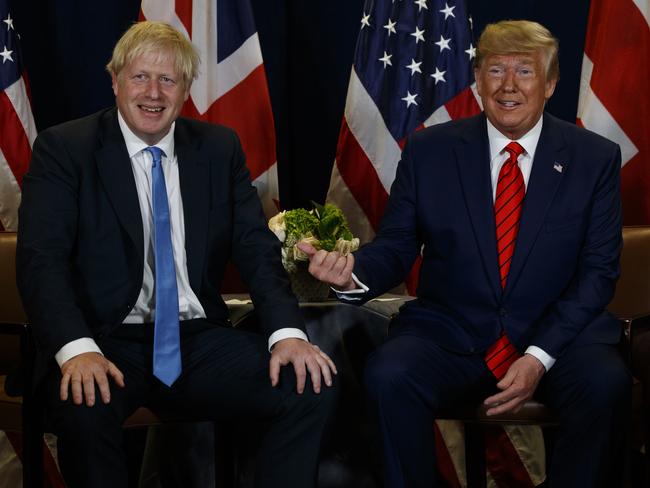
He is stuck and — alarmingly for a politician who wants to be liked — he’s divisive. Outside the Supreme Court in London last week, some Brexit supporters chanted “Boris is our leader.” But pro-European Britons spit out his name in conjunction with crude expletives.
Even before the court ruling, Johnson had a rough few weeks. Parliament passed a law to bind his hand, ordering the government to seek a delay to Brexit if it doesn’t approve a deal with the EU by late October.
Two ministers quit his Cabinet over Brexit — one of them his own younger brother, Jo Johnson. He was accused in the Sunday Times of giving public funding to a female friend (he denies wrongdoing) and was berated by the father of a sick child on a visit to a hospital.
But speaking to reporters on the plane to New York, Johnson seemed relaxed and more self-aware than he often appears in public.
He shrugged off the hospital confrontation, saying there was nothing wrong with “a spot of lively interchange with members of the public.”
Johnson’s successful stint as mayor of London between 2008 and 2016 shows that he can be an effective ambassador for the U.K.
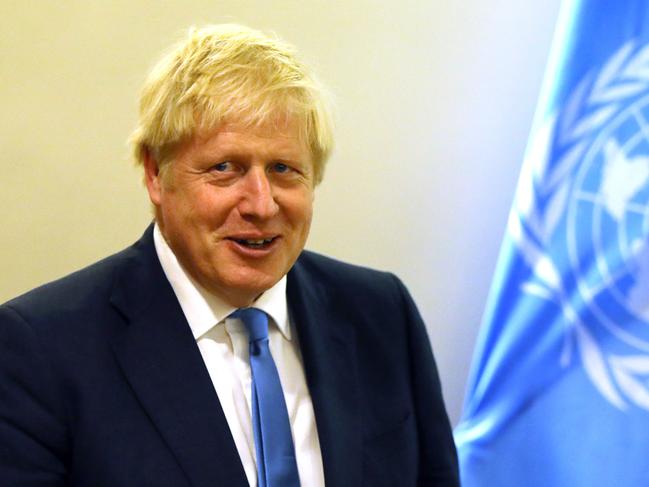
But his message in New York — that post-Brexit Britain will be “more global, more outgoing and more open to the rest of the world than ever before” — was drowned out by the crisis engulfing him in London.
Still, Downing Street officials insisted the trip had been a success, pointing to a joint U.K.-France-Germany statement blaming Iran for the attack on Saudi oil facilities and urging Tehran to comply with its nuclear responsibilities.
Johnson’s friends say it would be unwise to write him off just yet.
His most prominent friend at the U.N. was Trump, who may see in Johnson a leader with a divisive style — and woes — to match his own.
The two men have significant differences, especially on tackling climate change, a priority for Johnson. But the president was effusive when they met on Tuesday. “I know him well. He’s not going anywhere,” Trump told reporters. “Don’t worry about him.”
What Johnson said to the UN
Things the beleaguered British prime minister said in his astonishing speech to the U.N. General Assembly on Tuesday night: “Pink-eyed Terminators from the future.” “Terrifying limbless chickens.” “Your fridge will beep for more cheese.” Things Boris Johnson didn’t address with any substance: Brexit (though he mentioned it in a quip). The British court ruling earlier in the day that said he acted illegally by dissolving parliament. The take-no-prisoners politics that some say are threatening his premiership and undermining his influence as Britain’s leader.
Many didn’t know what to expect Tuesday after the court ruling came down hours before Johnson’s inaugural U.N. General Assembly speech as prime minister. But it’s safe to say few anticipated what he dramatically and energetically delivered: a caffeinated screed about the damage that technology can do if misused — and the glories it can hand humanity if it is delivered properly. In his notably energetic speech, which ended after 10pm as more than 12 hours of U.N. speeches were reaching their end, Johnson said he was optimistic about technology’s future — if humanity finds “the right balance between freedom and control.” The first potential future that Johnson mapped out was decidedly dystopian — one where technology permeates every corner of human life, and not in a good way. Digital assistants pretending to take orders — but actually watching you and acting against your interests. Computers that decide what you’ll get, where you’ll be allowed to go, who you’ll be.
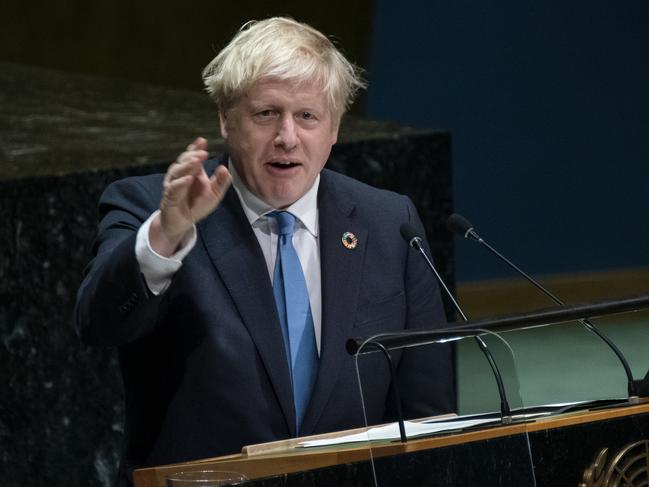
“You may keep secrets from your friends, from your parents, your children, your doctor — even your personal trainer — but it takes real effort to conceal your thoughts from Google,” he said. “And if that is true today, in future there may be nowhere to hide.” That is not, he said, a good thing at all.
“Can these algorithms be trusted with our lives and hopes?” he asked, his delivery staccato and his hands jabbing with emphasis. “Are we doomed to a cold and hard future where a computer says ‘yes’ or ‘no’?” But if things are done right, the prime minister said, a different story could unfold for all of us.
“How do you plead with an algorithm? How do you get it to see extenuating circumstances?” he said. “We need to find the right balance between freedom and control.” The tech-focused address was extraordinary given that immediately after it, he was to head back early to his home country to face a maelstrom of political problems — including the consequences of the court ruling and hearty calls for him to resign as prime minister.
In the speech, Johnson mentioned Brexit only once — as a pointed aside while recalling the myth of Prometheus, who was chained to a rock by Zeus and sentenced to have his liver eaten out by an eagle for eternity. “And this went on forever,” he quipped, “a bit like the experience of Brexit in the U.K, if some of our parliamentarians had their way.” But he said that with the right approach — one of “freedom, openness and pluralism” — and making sure that such voices are hear loudly “in the standards bodies that write the rules,” humanity can deliver itself to a brighter technological future.
“Together, we must ensure that new advances reflect our values by design,” he said, adding: “I am profoundly optimistic about the ability of new technology to serve as a liberator and remake the world wondrously and benignly. Indeed, in countless respects, technology is already doing just that.”
PARLIAMENT TO RESUME TONIGHT
Britain’s Supreme Court has ruled that Boris Johnson’s five-week suspension of parliament was unlawful.
John Bercow, the Anti-Brexit Commons Speaker in the British parliament, says the House is preparing to resume on Wednesday night (AEST).
Mr Bercow said there would be no Prime Minister’s Questions on Wednesday but there would be scope for urgent questions, ministerial statements and emergency debate applications.
Prime Minister Boris Johnson said in New York, where he is attending the United Nations General Assembly, that he “strongly disagrees” with the decision.
“I have to say that I strongly disagree with what the justices have found. I don’t think that it’s right but we will go ahead and of course parliament will come back,” he said. “It is perfectly usual to have a Queen’s speech that is what we want to do but, more importantly, let’s be in no doubt there are a lot of people who want to frustrate Brexit. There are a lot of people who want to stop this country coming out of the EU.”

A government spokesman told Sky News that Mr Johnson had spoken to the Queen after the ruling.
Mr Bercow welcomed the Supreme Court’s unanimous decision and said British citizens deserve to have parliament in session to scrutinise ministers and perform its other core functions.
The historic decision follows a dramatic three-day hearing last week where top lawyers battled it out over whether Mr Johnson misled the Queen.
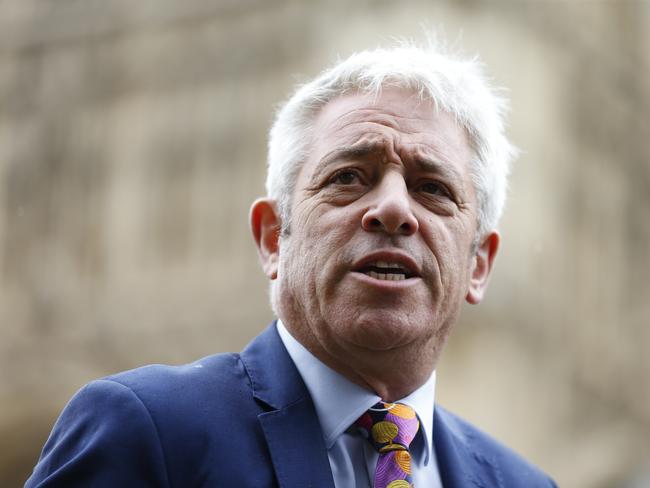
The PM could now be forced to jet back from the UN summit in New York to deal with the chaotic fall-out from the ruling.
In making the historic ruling, President Lady Hale said the Prime Minister’s decision to ask the Queen to shut down the Commons for five weeks was “unlawful, void and of no effect”.
MORE NEWS
What no-deal Brexit means for Ireland
Johnson’s plan if Brexit move fails
She said: “The decision to advise Her Majesty to prorogue was unlawful because it had the effect of frustrating or preventing the ability of parliament to carry out its constitutional functions.”
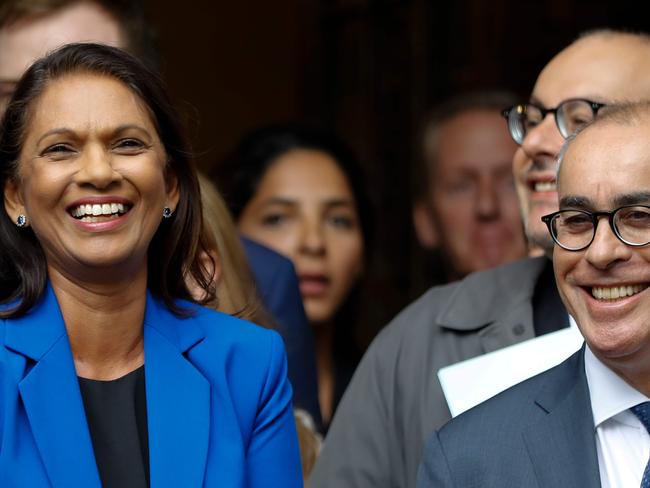
Anti-Brexit campaigner Gina Miller, who helped defeat Mr Johnson, hugged her lawyer in the courtroom as her victory was confirmed.
Ms Miller has called the Supreme Court ruling “a win for Parliamentary sovereignty, the separation of powers and independence of our British courts.”
She is one of the people who brought the case against the government, said the UK’s highest court unanimously ruled that Johnson advised the queen to shut down parliament “to silence our democratically elected MPs at one of the most critical times in our country’s modern history.”
Miller says that as a result of the decision, “parliament is open — it was never prorogued. I urge MPs to get back to work immediately.”
Outside in parliament Square, she said: “The ruling today speaks volumes. This Prime Minister must open the doors of parliament tomorrow. MPs must get back and be brave and bold in holding this unscrupulous government to account.”
After the ruling, a jubilant Labour leader Jeremy Corbyn called on Mr Johnson to consider his position and call a new election after the Supreme Court ruling.
“I invite Boris Johnson, in the historic words, to ‘consider his position’,” Mr Corbyn told delegates at the Labour Party’s annual conference in Brighton.
To huge cheers and chants of “Johnson out!”, Mr Corbyn said the British PM should become the shortest-ever serving leader and that Labour was ready to form a government.
Sinn Fein vice president Michelle O’Neill also said Mr Johnson should resign in the wake of the Supreme Court ruling.


